- Python Basic Programs
- Python Program Examples
- Python Print Hello World
- Python Get Input from User
- Python Add Two Numbers
- Add Subtract Multiply Divide
- Python Check Even or Odd
- Python Check Prime or Not
- Python Check Alphabet or Not
- Python Check Vowel or Not
- Python Check Leap Year or Not
- Check Reverse equal Original
- Check Positive Negative Zero
- Python Check Armstrong or Not
- Python Check Palindrome or Not
- Python Check Perfect Number
- Python Find Reverse of Number
- Python Count Digits in Number
- Python Add Digits of Number
- Sum of First and Last Digits
- Python Product of Mid Digits
- Sum of Squares of Digits
- Interchange Digits of Number
- Python Sum of n Numbers
- Python Print ASCII Values
- Python Swap Two Numbers
- Python Swap Two Variables
- Python Fahrenheit to Celsius
- Python Celsius to Fahrenheit
- Python Display Calendar
- Python Days into Years, Weeks
- Find Largest of Two Number
- Find Largest of Three Number
- Python Print Fibonacci Series
- Generate Armstrong Numbers
- Python Make Simple Calculator
- Python Add Binary Numbers
- Binary Number Multiplication
- Python Mathematical Programs
- Find Sum of Natural Numbers
- Find Average of n Numbers
- Python Print Multiplication Table
- Print Table using Recursion
- Python Find Average Percentage
- Python Find Grade of Student
- Find Square Root of Number
- Python Print Prime Numbers
- Find Numbers Divisible by
- Python Find Factors of Number
- Python Find Factorial of a Number
- Python Find HCF & LCM
- Python Kilometres to Miles
- Python Find Area of Square
- Python Find Area of Rectangle
- Python Find Area of Triangle
- Python Find Area of Circle
- Python Find Perimeter of Square
- Find Perimeter of Rectangle
- Python Find Perimeter of Triangle
- Find Circumference of Circle
- Python Simple Interest
- Python Solve Quadratic Equation
- Python Different Set of Operations
- Python Display Powers of 2
- Python Find nCr & nPr
- Python Pattern Programs
- Python Print Pattern Programs
- Python Print Diamond Pattern
- Python Print Floyd's Triangle
- Python Print Pascal's Triangle
- Python List Programs
- Python Count Even/Odd in List
- Python Positive/Negative in List
- Python Even Numbers in List
- Python Odd Numbers in List
- Python Sum of Elements in List
- Sum of Odd/Even Numbers
- Python Element at Even Position
- Python Element at Odd Position
- Python Search Element in List
- Python Largest Number in List
- Python Smallest Number in List
- Python Second Largest in List
- Python Second Smallest in List
- Python Insert Element in List
- Python Delete Element from List
- Python Multiply Numbers in List
- Swap Two Elements in List
- Python 1D Array Program
- Python Linear Search
- Python Binary Search
- Python Insertion Sort
- Python Bubble Sort
- Python Selection Sort
- Remove Duplicates from List
- Python Reverse a List
- Python Merge Two List
- Python Copy a List
- Python Conversion Programs
- Python Decimal to Binary
- Python Decimal to Octal
- Python Decimal to Hexadecimal
- Python Binary to Decimal
- Python Binary to Octal
- Python Binary to Hexadecimal
- Python Octal to Decimal
- Python Octal to Binary
- Python Octal to Hexadecimal
- Python Hexadecimal to Decimal
- Python Hexadecimal to Binary
- Python Hexadecimal to Octal
- Python Matrix Programs
- Python Add Two Matrices
- Python Subtract Two Matrices
- Python Transpose Matrix
- Python Multiply Matrices
- Python String Programs
- Python Print String
- Python Find Length of String
- Python Compare Two Strings
- Python Copy String
- Python Concatenate String
- Python Reverse a String
- Python Swap Two Strings
- Python Uppercase to Lowercase
- Python Lowercase to Uppercase
- Python Check Substring in String
- Python Count Character in String
- Count Repeated Characters
- Python Count Word in Sentence
- Python Count Each Vowels
- Python Capitalize Character
- Python Capitalize Word in String
- Python Smallest/Largest Word
- Remove Spaces from String
- Remove Duplicate Character
- Remove Vowels from String
- Remove Punctuation from String
- Python Remove Word in String
- Python Remove Duplicate Words
- WhiteSpace to Hyphens
- Replace Vowels with Character
- Replace Character in String
- Python Sort String in Alphabetical
- Sort Word in Alphabetical Order
- Extract Number from String
- Python Check Anagram Strings
- Python File Programs
- Python Read a File
- Python Write to File
- Python Append Text to File
- Python Copy Files
- Python Merge Two Files
- Python Counts Characters in File
- Python Count Words in File
- Python File Content in Reverse
- Python Lines Contains String
- Python Delete Line from File
- Python Capitalize Word in File
- Python Replace Text in File
- Replace Specific Line in File
- Python Find Size of File
- Python List Files in Directory
- Python Delete Files
- Python Misc Programs
- Python Reverse a Tuple
- Python Merge Two Dictionary
- Python bytes to String
- Python bytearray to String
- Generate Random Numbers
- Python Print Address of Variable
- Python Print Date and Time
- Python Get IP Address
- Python Shutdown/Restart PC
- Python Tutorial
- Python Tutorial
Python Program to Convert Decimal to Octal
This article is created to cover some programs in Python, to convert decimal number entered by user at run-time to its equivalent octal value. Here are the list of programs:
- Decimal to Octal using list and while Loop
- Using oct() method
- Using function
- Using class
Note - Before creating these programs, if you're not aware about steps used for the conversion, then refer to Decimal to Octal Conversion Steps and Example to get every required things about the topic.
Decimal to Octal using List and while Loop
To convert decimal to octal number in Python, you have to ask from user to enter a number in decimal number system, then convert that number into its equivalent value in octal number system as shown in the program given below. The question is, write a Python program to convert decimal to octal using list and while loop. Here is its answer:
print("Enter the Decimal Number: ") decnum = int(input()) i = 0 octnum = [] while decnum!=0: rem = decnum%8 octnum.insert(i, rem) i = i+1 decnum = int(decnum/8) print("\nEquivalent Octal Value is: ") i = i-1 while i>=0: print(octnum[i], end="") i = i-1 print()
Here is its sample run:
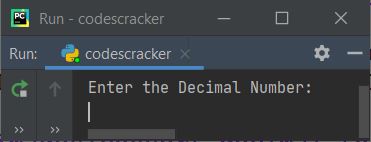
Now supply the input say 346 as a decimal number, then press ENTER key to convert and print
its equivalent octal value as shown in the snapshot given below:
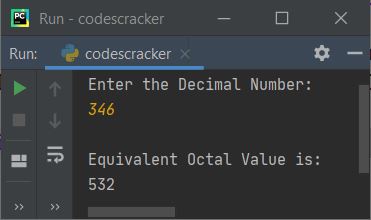
The dry run of above program with user input 346 goes like:
- Initial values, decnum=346 (entered by user), i=0
- The condition (of while loop) decnum!=0 or 346!=0 evaluates to be true, therefore program flow goes inside the loop
- decnum%8 or 346%8 or 2 gets initialized to rem
- And using the following statement:
octnum.insert(i, rem)
the value of rem gets initialized to octnum[i]. So octnum[i] or octnum[0] = 2 - i+1 or 0+1 or 1 gets initialized to i
- int(decnum/8) or int(346/8) or 43 gets initialized to decnum
- The condition of while loop again gets evaluated with new value of decnum
- That is, the condition decnum!=0 or 43!=0 evaluates to be true again, therefore program flow goes inside the loop. This process continues until the condition evaluates to be false
- In this way, the list octnum holds equivalent octal value of given decimal number by user at run-time
- After exiting from the loop, decrement the value of i. Because before the condition of while loop evaluates to be false, the value of i was incremented
- Now print octnum[] list one by one from its last index to 0th index
Modified Version of Previous Program
This is the modified version of previous program. This program uses end= to skip printing of an automatic newline using print()
print("Enter Decimal Number: ", end="") dnum = int(input()) i = 0 onum = [] while dnum!=0: onum.insert(i, dnum % 8) i = i+1 dnum = int(dnum / 8) print("\nEquivalent Octal Value = ", end="") i = i-1 while i>=0: print(onum[i], end="") i = i-1 print()
Here is its sample run with user input 3112 as decimal number input:
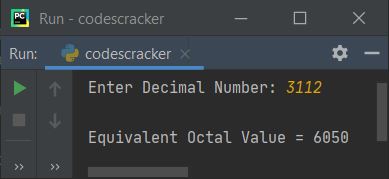
Decimal to Octal using oct()
The method oct() returns octal equivalent of value passed as its argument.
print("Enter Decimal Number: ", end="") dnum = int(input()) onum = oct(dnum) print("\nEquivalent Octal Value = ", onum)
Here is its sample run with decimal number input as 1234:
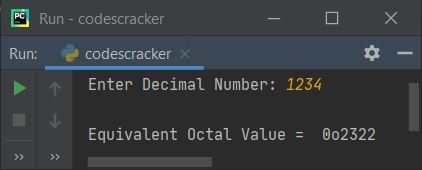
Note - To skip first two characters of octal number output, add [2:] after onum while printing. That is, replace the following statement (from above program):
print("\nEquivalent Octal Value = ", onum)
with the statement given below:
print("\nEquivalent Octal Value = ", onum[2:])
Now the output looks like:
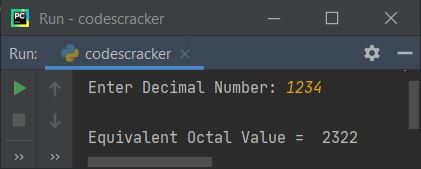
Decimal to Octal using Function
This program is created using user-defined and predefined functions both. The user-defined function named DecToOct() receives a value as its argument and returns its octal equivalent using oct() method.
def DecToOct(d): return oct(d) print("Enter Decimal Number: ", end="") dnum = int(input()) onum = DecToOct(dnum) print("\nEquivalent Octal Value =", onum[2:])
Using the following statement:
onum = DecToOct(dnum)
The value of dnum variable (stores decimal number entered by user) gets passed to DecToOct() function. And this function returns its equivalent octal value. Therefore this value (octal) gets returned and initialized to onum variable. Now print the value of onum variable as octal equivalent of given decimal number.
Decimal to Octal using Class
This program is created using class, an object-oriented feature of Python. That is, a class named CodesCracker is created with a member function named DecToOct(). To access member function of a class, an object of class can be used. Therefore an object named obj is created of class CodesCracker to access its member function named DecToOct() using dot (.) operator.
class CodesCracker: def DecToOct(self, d): return oct(d) print("Enter Decimal Number: ", end="") dnum = int(input()) obj = CodesCracker() onum = obj.DecToOct(dnum) print("\nEquivalent Octal Value =", onum[2:])
Same Program in Other Languages
« Previous Program Next Program »